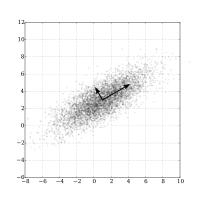
Photo from wikipedia
The canonical correlation analysis (CCA) has attracted wide attention in fault detection (FD). To improve the detection performance, we propose a new joint sparse constrained CCA (JSCCCA) model that integrates… Click to show full abstract
The canonical correlation analysis (CCA) has attracted wide attention in fault detection (FD). To improve the detection performance, we propose a new joint sparse constrained CCA (JSCCCA) model that integrates the l2,0 -norm joint sparse constraints into classical CCA. The key idea is that JSCCCA can fully exploit the joint sparse structure to determine the number of extracted variables. We then develop an efficient alternating minimization algorithm using the improved iterative hard thresholding and manifold constrained gradient descent method. More importantly, we establish the convergence guarantee with detailed analysis. Finally, we provide extensive numerical studies on the simulated dataset, the benchmark Tennessee Eastman process, and a practical cylinder-piston process. In some cases, the computing time is reduced by 600 times, and the FD rate is increased by 12.62% compared with classical CCA. The results suggest that the proposed approach is efficient and fast.
Journal Title: IEEE transactions on neural networks and learning systems
Year Published: 2022
Link to full text (if available)
Share on Social Media: Sign Up to like & get
recommendations!